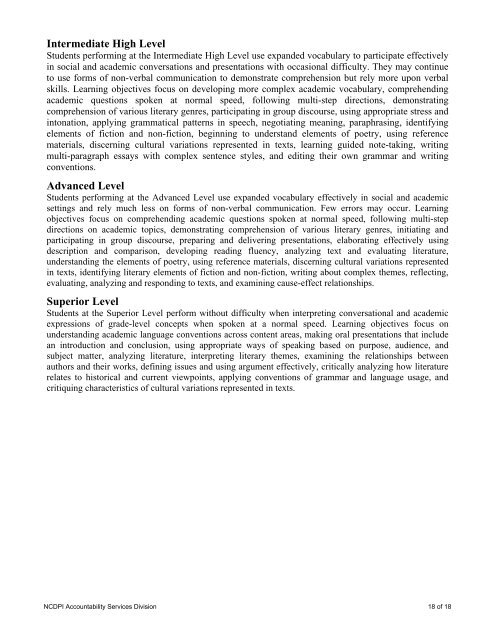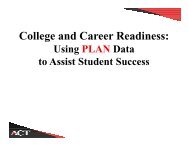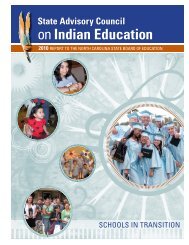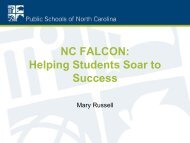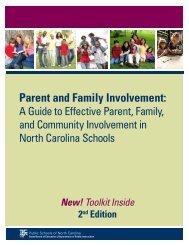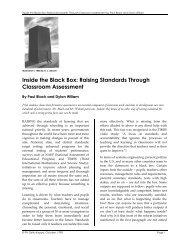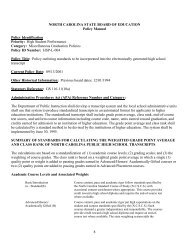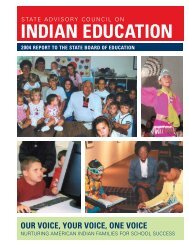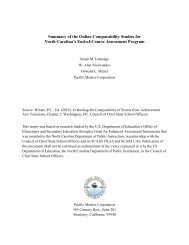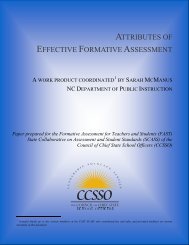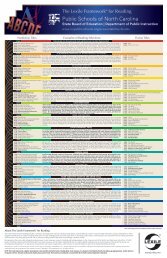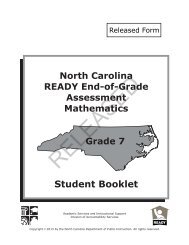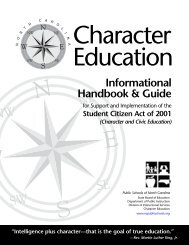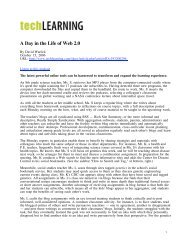Achievement Levels for IDEA English Language Proficiency Test (IPT)
Achievement Levels for IDEA English Language Proficiency Test (IPT)
Achievement Levels for IDEA English Language Proficiency Test (IPT)
You also want an ePaper? Increase the reach of your titles
YUMPU automatically turns print PDFs into web optimized ePapers that Google loves.
Intermediate High Level<br />
Students per<strong>for</strong>ming at the Intermediate High Level use expanded vocabulary to participate effectively<br />
in social and academic conversations and presentations with occasional difficulty. They may continue<br />
to use <strong>for</strong>ms of non-verbal communication to demonstrate comprehension but rely more upon verbal<br />
skills. Learning objectives focus on developing more complex academic vocabulary, comprehending<br />
academic questions spoken at normal speed, following multi-step directions, demonstrating<br />
comprehension of various literary genres, participating in group discourse, using appropriate stress and<br />
intonation, applying grammatical patterns in speech, negotiating meaning, paraphrasing, identifying<br />
elements of fiction and non-fiction, beginning to understand elements of poetry, using reference<br />
materials, discerning cultural variations represented in texts, learning guided note-taking, writing<br />
multi-paragraph essays with complex sentence styles, and editing their own grammar and writing<br />
conventions.<br />
Advanced Level<br />
Students per<strong>for</strong>ming at the Advanced Level use expanded vocabulary effectively in social and academic<br />
settings and rely much less on <strong>for</strong>ms of non-verbal communication. Few errors may occur. Learning<br />
objectives focus on comprehending academic questions spoken at normal speed, following multi-step<br />
directions on academic topics, demonstrating comprehension of various literary genres, initiating and<br />
participating in group discourse, preparing and delivering presentations, elaborating effectively using<br />
description and comparison, developing reading fluency, analyzing text and evaluating literature,<br />
understanding the elements of poetry, using reference materials, discerning cultural variations represented<br />
in texts, identifying literary elements of fiction and non-fiction, writing about complex themes, reflecting,<br />
evaluating, analyzing and responding to texts, and examining cause-effect relationships.<br />
Superior Level<br />
Students at the Superior Level per<strong>for</strong>m without difficulty when interpreting conversational and academic<br />
expressions of grade-level concepts when spoken at a normal speed. Learning objectives focus on<br />
understanding academic language conventions across content areas, making oral presentations that include<br />
an introduction and conclusion, using appropriate ways of speaking based on purpose, audience, and<br />
subject matter, analyzing literature, interpreting literary themes, examining the relationships between<br />
authors and their works, defining issues and using argument effectively, critically analyzing how literature<br />
relates to historical and current viewpoints, applying conventions of grammar and language usage, and<br />
critiquing characteristics of cultural variations represented in texts.<br />
NCDPI Accountability Services Division 18 of 18


